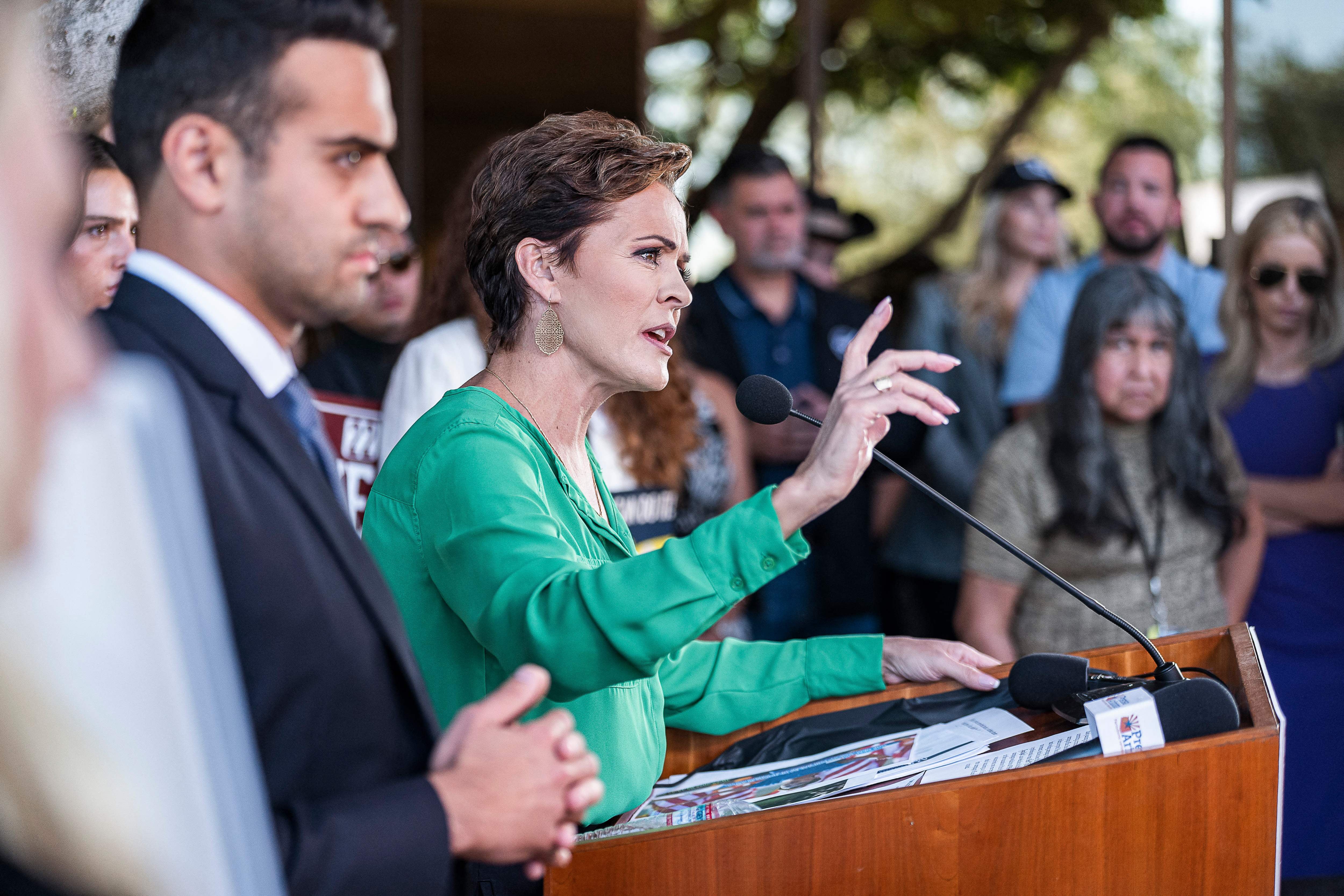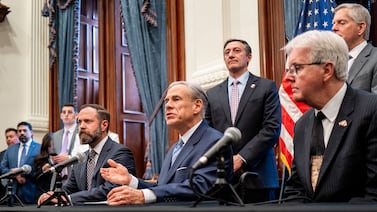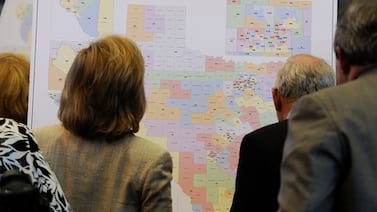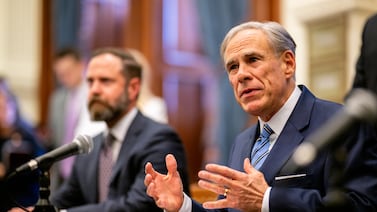After hearing a hodgepodge of claims from three losing GOP candidates alleging inaccuracies in the midterm election, Arizona judges rejected many of the most far-reaching and unsubstantiated claims, but are allowing other claims to move forward.
While judges in Maricopa and Mohave counties this week shot down most of gubernatorial candidate Kari Lake’s claims and dismissed secretary of state candidate Mark Finchem’s lawsuit entirely, most of attorney general candidate’s Abe Hamadeh’s claims will get a full hearing.
Judges rejected a kitchen-sink approach from Lake’s and Finchem’s lawyers — who lack experience in bringing election contests in the state — in which they made accusations about illegal votes and intentional errors, often without substantial evidence or based on old data. Their approach differs from Republican contests in past election cycles, even 2020, when experienced lawyers focused narrowly on specific voting problems, and tried to prove with evidence that the problems were scalable and affected the outcome.
Mohave County Superior Court Judge Lee Jantzen said Hamadeh’s lawsuit stands out from the others because it is not “alleging political motives or fraud or personal agendas being pushed.”
“It is simply alleging misconduct by mistake, or omission by election officials, led to erroneous count of votes and which if true could have led to an uncertain result,” Jantzen said. Hamadeh’s race is particularly tight. He trails Attorney General-elect Kris Mayes by just 511 votes, and the automatic statewide recount for that race is nearing completion.
In contrast, Maricopa County Superior Court Judge Melissa Julian on Friday called Finchem’s arguments “frivolous” and “wholly unsupported by the record,” saying that many were procedural claims and others didn’t have merit. Finchem lost his race against Adrian Fontes by about 120,000 votes. His lawyer now potentially faces sanctions.
When the trial in Hamadeh’s case begins Friday, the court will examine whether errors made when checking voters in and out of polling places during Maricopa County’s ballot printing problems, and when duplicating and adjudicating ballots, could have affected the election results. During Lake’s trial, she will need to prove that county officials failed to correctly accept and track ballots, or prove that the widespread ballot printing problems in Maricopa County on Election Day were intentional, and that one or both of these changed the results. Lake lost her gubernatorial bid to current Secretary of State Katie Hobbs by about 17,000 votes.
Both candidates were given the right to inspect a small sampling of ballots prior to the trials. The trial in Lake’s case is set for Wednesday and Thursday.
Judges reject catch-all approach to election contests
Lake and Finchem’s lawyers each presented a grab-bag of claims. They pointed to alleged mistakes made by election workers in 2020 as evidence that there were widespread errors in this election. They used testimony from a few voters who said they could not vote because of Election Day problems to claim mass and intentional voter disenfranchisement. They recycled a false claim that voting machines weren’t properly certified, and tested a new claim that alleged social media censorship in 2021 played a role in the candidates’ 2022 loss.
The judges were not willing to entertain most of the losing candidates’ claims. They dismissed claims they said merely questioned long-established election procedures, such as how workers verified signatures and how the state and federal government certified voting machines. They also rejected claims that they said lacked merit and those where they said they couldn’t find an actual legal argument, such as the censorship claim.
Noticeably absent from the cases were high-profile Arizona Republican election attorneys — familiar names such as Alex Kolodin, Kory Langhofer, and Eric Spencer. They all declined to comment on why they were not involved.
Instead, the cases were brought mostly by lawyers who either weren’t experienced in election law practitioners or were from outside of the state. The exception is Hamadeh’s case, which was argued by Tim LaSota, who often represents Republican politicians and groups in the Valley, and later joined by prominent election attorney Jack Wilenchik.
Election law attorney Tom Ryan said it’s obvious Republican attorneys are now declining election contests out of fear of sanctions, which he believes should be issued more frequently in frivolous cases, and issued to the candidates themselves. He said it’s not these candidates’ intentions to bring winning, or even meritorious, cases.
“It’s not about the litigation, it’s not about the case, it’s not about the ruling. It’s about selling a narrative to those who don’t want to see their preferred candidate lose, and quite frankly it’s the MAGA people who are doing this,” Ryan said.
Lake was represented by the lawyer that represented Cyber Ninjas during their review of 2020 ballots, Bryan Blehm, who works for a Phoenix-based family law practice, as well as by Kurt Olsen, a Washington, D.C.-based attorney involved in 2020 election challenges.
Finchem’s lawyer, business litigation attorney Daniel McCauley, told the judge he was “semi-retired and want[s] to be out of the law.”
“I took this because they needed somebody to do it,” he said. “And so, you know, I guess I have the least risk. If I get into trouble and get disbarred here, I’m 76 or 77 by the time they get to it.”
McCauley told the judge that the case was focused on making a point about election integrity, that he didn’t need a “big victory.”
Julian gave Secretary of State Katie Hobbs and Secretary of State-elect Adrian Fontes 10 days to file a request for sanctions against McCauley. Earlier this month, U.S. District Court Judge John Tuchi sanctioned the attorneys who brought Finchem and Lake’s now-dismissed case that claimed tabulation machines were inaccurate and insecure.
Meanwhile, Finchem and Lake are using the post-election challenges as fundraising opportunities on social media. “Legal battles aren’t cheap,” Lake wrote on Twitter, adding a fundraising link, after announcing her claims would go to trial.
Lawyers for the secretary of state’s office and Secretary of State-elect Adrian Fontes, two of the defendants, reminded judges of the high bar for election contests as they asked the court to dismiss the lawsuits in Maricopa and Mohave superior courts. Attorney Andy Gaona, representing the secretary of state’s office, said during a Monday hearing for Lake’s case that the court’s decisions wouldn’t just affect the immediate case but also is “about the stability of the election system.”
Fontes’ attorney Craig Morgan said Finchem’s lawsuit was “just one of a series of meritless lawsuits that continue to perpetuate divisive and frankly harmful rhetoric.”
“We just need it to stop,” Morgan said.
Lake’s claims to be considered in trial
In Maricopa County, Judge Peter Thompson ruled on Monday that two out of ten claims made by Lake will be heard at trial. Lake is asking the court to throw out the election results and declare her winner.
In her suit, she alleged that the widespread ballot printer problems in Maricopa County, which caused problems tabulating ballots on site at 71 of 223 locations at least, were caused by a person or people employed by Maricopa County interfering with the printers, resulting in lost votes.
One of the claims moving forward alleges that a Maricopa County employee intentionally sabotaged ballots so that they wouldn’t be scanned properly.
At trial, she must prove that the printer problems were intentional, “directly resulted in identifiable lost votes” for her, and that “these votes would have affected the outcome of the election,” Thompson wrote.
Voters whose ballots were affected by printing problems were still able to cast their vote by placing them into a secure ballot box to be scanned at the county election center. But Lake says that Maricopa County’s printer problems meant that “thousands of Republican voters were disenfranchised.”
Lake’s legal team relied on what they described as “expert evidence” to assert that thousands gave up voting due to long wait times or “simply avoided the polls after seeing the chaos.”
This argument, Maricopa County attorney Tom Liddy told the judge, is insulting to the court and to Black Americans who have faced real voter suppression.
“It is an odious argument and it is frivolous,” Liddy said.
The county’s lawyers pointed out that Lake did not say who was involved in the intentional tampering with the printers, and where and when this took place. “These fantastic allegations fall woefully short,” they wrote.
The second claim to be heard at trial relies on testimony from one person who worked at an election contractor to claim that election workers didn’t follow proper procedures for accepting and tracking ballots.
The first part of the claim alleges that the county didn’t properly use an inbound receipt form when accepting mail-in ballots on Election Day. County lawyers said in a court filing that this is false, and can be easily disproven.
“The chain of custody documents for election day are different because the process for early ballot delivery is different on election day,” they wrote.
The claim also alleges that Runbeck Election Services, which helps the county process mail-in ballots, illegally allowed employees to cast their own ballots and the ballots of family members on-site.
As part of this claim, Lake originally argued that there would be no way to tell whether the about 290,000 Election Day mail-in ballots “are legal ballots.”
If the county didn’t follow its procedures, this would “constitute misconduct,” Thompson wrote. But Lake would also need to prove not just that this misconduct happened, Thompson wrote, but that it affected the outcome of the election.
County Recorder Stephen Richer told Votebeat that Runbeck is not permitted to let employees cast their ballots or ballots of their family members on-site.
Hamadeh’s claims to be considered in trial
Jantzen will hear four of five claims from Hamadeh’s lawsuit. The claims included scant evidence, with most saying they were based simply on “information and belief.”
Hamadeh has a high burden to overcome to have his election overturned, Jantzen wrote.
“The Court must make these determinations based on facts and not mere conclusions such as ‘on information and belief,’ ” he wrote. “However, at this stage in the unique proceedings of an election contest, the Court finds Plaintiff has the right to present its case and even gather additional information.”
Two of the claims involve Maricopa County’s ballot-printing problems, claiming that the county’s poll workers didn’t properly check out voters from locations that were having problems so they could easily vote elsewhere. He alleges those voters then tried to vote at a second location or tried to cast their mail-in ballot instead but that the county didn’t count those ballots. He also claims that some voters were not given the option of casting a provisional ballot when they arrived at a second polling location.
County officials have said that they were able to reconcile problems to ensure that one ballot was counted for each voter.
The other two complaints allege that election officials across the state made errors when replicating damaged ballots or ballots that couldn’t be read by a tabulation machine, and when determining voter intent on ballots where selections were unclear.
Attorney Dan Barr, who represented Mayes, said that innocent mistakes do not constitute misconduct, no matter how many were made.
“Their complaint is literally zero plus zero plus zero plus zero equals something more than zero, and that simply isn’t so,” Barr said.
Dismissed: Claim that voter signatures weren’t properly verified
Judges dismissed claims made by Hamadeh and Lake that the county’s method to determine the validity of signatures on mail-in ballot envelopes was inadequate.
Lake relied on testimony from county workers who verified signatures to make the claim, as well as data she said examined how signatures were verified in 2020.
Thompson said that Lake’s case was not the proper place to challenge long-standing procedures for signature verification, and said it was too late to question how signatures were reviewed in 2020.
“Because Plaintiff was on notice (at a minimum) months before the election as to the nature of the ballot signature reconciliation process and chose not to challenge it then, her claim is barred by laches,” Thompson wrote, referring to a legal principle that claims must be made in a timely manner.
In Hamadeh’s case, Jantzen similarly noted that Hamadeh did not allege that workers failed to follow procedures in state law.
Dismissed: Claims on equipment certification and social media censorship
Finchem’s case recycled a 2020 claim that tabulation machines weren’t properly certified by accredited companies under the U.S. Election Assistance Commission.
Julian was not convinced this was true. And, she wrote, even if they weren’t properly certified, “what then?” She said there was no misconduct stemming from the allegation, it had no merit, and it was also too late to bring the challenge.
“What, apart from a general pall of suspicion could result from such a conclusion? The law in Arizona does not permit an election challenge to proceed based solely upon a vague sense of unease,” she wrote.
Likewise, in Lake’s lawsuit she claimed that ballot printers should have been certified. The judge found that the printer isn’t an official part of the vote tabulating system, so under federal and state laws, it doesn’t need to be.
Dismissed: Claim of social media censorship
Separately, piggybacking off a recent viral social media claim, both Finchem and Lake both brought up in their lawsuits how Hobbs and Richer – like many election officials across the country – communicate with government or nonprofit agencies that report misinformation spreading on social media to the social media companies. GOP leaders earlier this month said that two requests from Hobbs to a nonprofit to report misinformation was akin to censoring free speech. Those requests were made in early 2021, before Hobbs announced her candidacy.
In Lake’s case, Thompson said it was unclear if she was attempting to make a First Amendment claim, or if she was, why it would constitute election misconduct.
“Both actions alleged to be misconduct took place months prior to canvassing, and consequently cannot be considered misconduct under the statute,” he wrote.
Jen Fifield is a reporter for Votebeat based in Arizona. Contact Jen at jfifield@votebeat.org.






